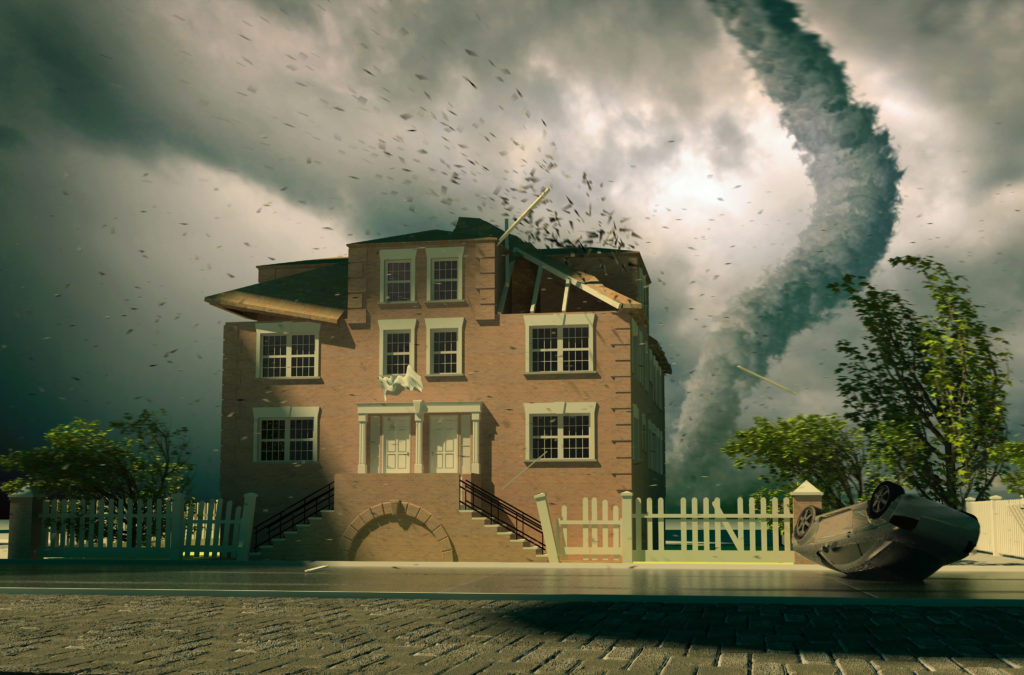As a child, I lived in a Pennsylvania town where, on hot summer nights, we would be clobbered by thunderstorms. These were not gentle light displays. They were explosions of fury that sizzled the sky. They made me feel like a cartoon character who’d stuck his head in a cannon.
The arrival of such a storm always sent my brothers and me into a terror. The air would slow and thicken, coiling in on itself. Far away, near Allentown, the sky would flicker. For a minute or two, the lights would pause, like maybe the storm had skirted the hills around us. Only then would it roll right over the Lehigh Valley, detonating over the roof of our house.
I wish I could say it was a delicious pleasure, sitting on our back porch in the blurry darkness, waiting for the first clap and lightning jolt. My parents seemed to think so. They were young, I now realize—not even forty—probably drinking an after-dinner cocktail, enjoying the cozy feel of the family as one, me and my brothers in our pajamas. The dog whimpering.
I’ve been reminded of this time a lot lately. I am not making light of this pandemic, one that will kill many thousands of people before it is brought under control, or the economic panic that is now scorching through markets. But the way it has unfolded, the deep variation in who finds it scary and who doesn’t, and how it seems perhaps far enough off—as I type this, that’ll change—it reminds me of those muggy summer nights.
If you are reading this and feeling afraid, this is just to say you are not alone. Panic is, of course, one of the great contagions of a contagion. But turning away from information feels, sometimes, equally alarming. What might happen while we’re not looking?
Those nights on the porch, when one or more of us couldn’t take the dread, we’d run to our bedrooms. And there I’d do what seemed the most logical thing: I’d leave. I’d open a book and go someplace a little more hospitable, not quite so loud, where nothing had quite so much power over me. And yet my worst fear was that a lightning bolt would come scissoring down and evaporate my mother while I was upstairs, reading, oblivious.
This didn’t happen, another more metaphorical bolt took her from us, years later—but that kind of fear, it never goes away. We love whom we love and we worry for them when it seems there’s reason to worry. Like now. My father, healthy as a goat, is eighty today, and I’m worried he’s going to get bored and go out for coffee. He’s worried I’m wandering up and down Manhattan, touching subway poles and rubbing my eyes. My niece isn’t worried at all: she’s just glad to be out of school.
In her great book Illness as Metaphor, Susan Sontag noted how we all hold dual citizenship of the land of the well and that of the unwell. Maybe worry is the bridge between the towns. The president, that great, jubilating shrinker of citizenship as a concept, talked to cameras the other night. Do not worry, he said. It is just the elderly who will get this, not the young and healthy. I wonder how it felt to hear that as someone, well, the president’s age—or older?
Does anybody feel less vulnerable knowing that they might survive but their parents might not? Their grandparents might not? Their neighbor might not?
For decades, from the very highest microphones, the messages we’ve received in America have told us to watch out only for ourselves. Look out for number one. Turn away from the weak—what an epithet this president has made of that word. Wall ourselves off. Now we’re facing a virus that respects no borders or walls and thrives on a fact of biology that has been staring us in the face for centuries—which is that we’re all connected.
Shared vulnerability is essential to family life—and to citizenship. What each of us does affect us all. So washing hands isn’t just about protection; it’s about not spreading contagion that I, perhaps, am better suited to sustain than someone else.
It’s about accepting that you cannot opt out of an ecosystem. We can manage our interconnectedness, we can live with its consequences. As schools let out, and work, too, and we all are suddenly at home together—what new schools of information will grow from our isolation? The internet so often made me feel we were alone when we were together, but now, together and alone, might it save us?
Many years on, I would learn that my mother hated lightning storms. That was my parents’ role to play: to not allow themselves to be overwhelmed by their fear. Later, always, my mother would come to the room I shared with my brother. She’d sit first on his bed and then mine and tell us that things were okay. Then she’d run through all the things we’d do the next day, so many I often became sleepy as she listed them—which was, I’m sure, the point. I imagine many of us are doing something similar in the quiet of our bedrooms. In the dark of our own heads. Tomorrow we’ll get up and work, or teach our kids at home, or go check on our parents. That it will just be a new day. Showing each other—and ourselves—how when bravery comes with tenderness, even the most terrible fears can be held at bay.
John Freeman is the author of Dictionary of the Undoing and the editor of Freeman’s, a literary annual.
from The Paris Review https://ift.tt/3dgYc0j

Comments
Post a Comment